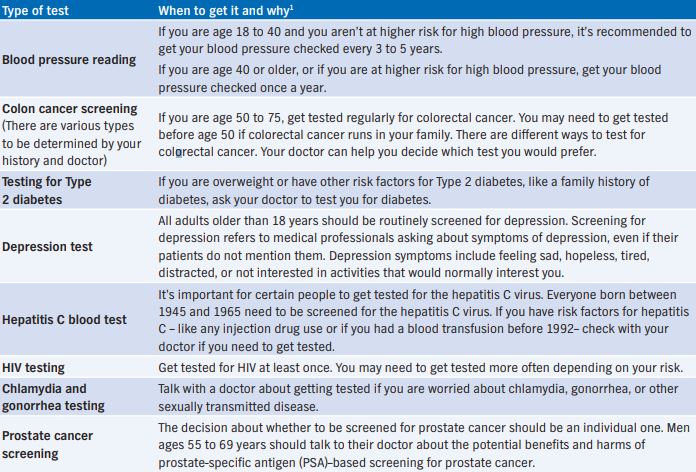
Here’s a checklist to help you:

Stay Up-To-Date With Your Shots
- Get a flu vaccine every year. The seasonal flu vaccine is the best way to protect yourself and others from the flu.
- Get the Tdap shot to protect against tetanus, diphtheria, and whooping cough (pertussis). Everyone needs to get the Tdap shot once.
- After you get a Tdap shot, get a Td shot every 10 years to keep you protected against tetanus and diphtheria.
If you are age 60 or older, get shots for older adults. Older adults need shots to protect against diseases like pneumonia and shingles.
Ask Your Doctor About Medicines To Prevent Heart Attacks and Strokes
Statins are medicines that reduce the risk of heart attack and stroke by helping to lower or prevent high cholesterol. Statins are usually recommended for individuals’ age 40 to 75 with high cholesterol, diabetes, high blood pressure, or who smoke when their doctor has decided they are at high risk for heart attack and stroke.
Statins aren’t right for everyone, and all medicines have pros and cons. When you talk with your doctor about taking a statin, it’s important to discuss your personal history as well as your risk for heart attack and stroke.
What about aspirin? Talk with your doctor about taking aspirin to prevent disease. Taking low-dose aspirin (or “baby aspirin”) regularly can lower your risk for heart attack, stroke, and colorectal cancer. For most people, aspirin is safe. But it’s not right for everyone.
Ask your doctor about taking aspirin regularly if you are age 50 to 59 and you have any of these risk factors for heart disease: smoking, high blood pressure, high cholesterol, or diabetes.
Other Healthy Habits to Keep
- Get help to quit. If you smoke, ask your doctor about services to help you quit.
- Eat a healthy diet. If your doctor has told you that you are at risk for heart disease or diabetes, ask about dietary counseling. Focus on eating a healthy diet, including at least five servings of fruits and vegetables daily.
- Watch your weight. If you are overweight, ask your doctor about screening and counseling for obesity.
- Drink alcohol in moderation. If you choose to drink, have only a moderate (limited) amount. This means: no more than 2 drinks a day for men.
Always talk to your doctor to find out what tests or screenings are right for you.
Recent Posts
The U.S. Department of Labor Announces Proposed Rule To Protect Indoor, Outdoor Workers From Extreme Heat
The U.S. Department of Labor has proposed a new rule aimed at protecting workers from extreme heat hazards. This initiative seeks to safeguard approximately 36 [...]
Supreme Court Overturns Chevron Deference: What It Means for Workplace Safety and Regulation
The landscape of federal regulation is set for a seismic shift following a recent Supreme Court decision. On June 28, in Loper Bright Enterprises, et [...]
Navigating the Compliance Maze: How NARFA Simplifies Employee Benefits for Automotive and Trade Industries
In today's complex regulatory environment, businesses in the automotive, roads, fuel, and related industries face unprecedented challenges in managing employee benefits. Recent studies show that [...]



